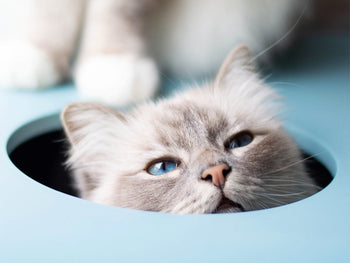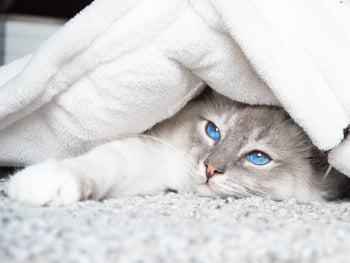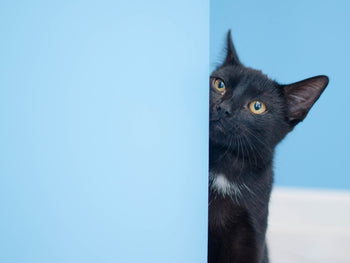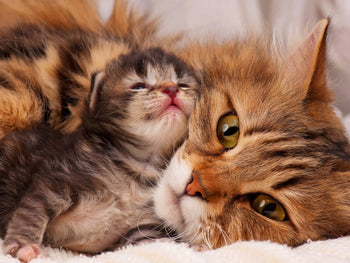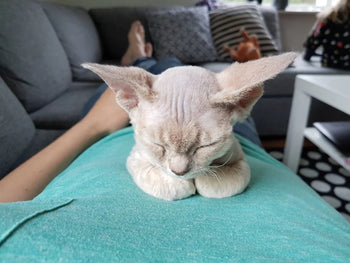
Virtually every cat parent around the globe knows that the felines tend to do whatever they want without apparent reasons. As a result, you really have nothing to worry about if you notice your fluffy friend going bonkers on occasions. That being said, abnormal postures (walking, sleeping, sitting,...) may be early signs of serious underlying health problems, especially in senior cats. So to be on the safe side, if your cat won't sit down all the way, it's of utmost importance that you assume the pet is in trouble.
Don't know what is the best course of action? If that is so, you need to take a close look at the following information. Down below, you shall find critical details that all pet owners must remember regarding the issue of "cat won't sit down all the way" including causes, treatments and preventions.
Causes: A Couple Of Suspects

Generally speaking, a lot of things could change the postures of the felines but if your cat won't sit down all the way, keep in mind these potential culprits.
-
Arthritis
To put it plainly, arthritis is a disease that affects the joints of the body. As time passes by, the cartilages between the bones start to deteriorate which makes the joints become less and less flexible. Eventually, the stiffness among affected joints leads generates a great deal of pain during movements. A lot of cat parents believe that being such agile animals, cats rarely experience arthritis. Unfortunately, the pets remain vulnerable to the disease, they simply hide the resulting pain well.
-
Injuries
Possessing a combination of sharp senses and flexible body, cats would be able to perform spectacular gymnastic feats at whim. Nonetheless, it's worth noting that the felines make mistakes from time to time such as mess up landings, fall from heights and so on. Hence, in the case your cat won't sit down all the way, assess its body for signs of injuries. Needless to say, injured pets tend to react aggressively to touches so be careful here. Put on a thick pair of gloves as a precaution.
The average cats run into constipation many times in their lifetime and thankfully, the situation often resolves itself without interventions. However, in severe cases, constipation may cause significant pain to the rectum of the pets which inevitably force them to avoid sitting down like usual. If you suspect that your furball is suffering from constipation, drop by the litter box. Constipated cats have a hard time defecating so by checking the litter box, it's simple for pet owners to deduce what is going on.
-
Allergy
Overall, different cats have different constitutions which means allergic reactions vary greatly between individual pets. Usually, after coming into contact with allergens, the felines shall immediately experience a variety of issues like coughing, sneezing, wheezing,... However, if your cat happens to be extremely allergic to specific allergens in the surroundings, its body could become swollen. Obviously, the pet would be incapable of sitting down normally if its rear swells up. Usually, a thorough examination is necessary to identify the allergens.
-
Stress
Cats excel at masking what they feel at the moment but in stressful situations, some of their behaviors inadvertently change. As the felines like familiar routines and well-accustomed scenes, a minor deviation in the house is enough to throw your furball into a panic. Signs of stressful cats include rapid grooming, frequent head shaking, dilated pupils, altered sitting posture,... In order to protect your cat from stress, it's strongly recommended by the vets that you don't expose the pet to sudden changes.
Treatments: Contact Veterinarians At Once

While some issues that force cats to sit awkwardly could be solved by cat parent, a trip to the vets is always a safe bet. Compared to ordinary pet owners, professional veterinarians simply have superior knowledge as well as tools to tackle illness in cats.
Nowadays, you should be able to make an appointment at the local veterinary clinic just by making a phone call. Once you arrive, the vets shall conduct an in-depth diagnosis to determine the issue that is troubling the pet. Afterward, you would be informed about the current situation, treatment regime and post-treatment recovery. Needless to say, it's essential that you strictly follow the instructions from veterinarians here. When the health of your furball is on the line, don't take unnecessary risks.
Note: No matter what your cat, you must refrain from giving it random medication without obtaining clearance from the vets. Medication may take care of the symptom but unless the underlying issue is solved, the pet is still at risk.
Check us out for further detailed cat's health guide!
Preventions: Close Attention Is Key

In the wild, predators often prioritize preys that exhibit signs of illness which is why most cats would never come to humans asking for help. So while your fluffy friend faces no significant threat in the house, it nonetheless prefers to keep things to itself. Because of that, pet owners have to keep watch over their cats at all times. Aside from its postures, you need to pay attention to the diet, the mood and the safety of your cat. Here are a few suggestions you should keep in mind:
- Put Together Well-Balanced Meals: Cats shall live a healthy life if they manage to receive sufficient nutrients every day. If your furball is on medication, ask the vets for advice regarding ideal daily diet. The rule of thumb here is "better safe than sorry".
- Lock All Accesses To Outside: Cats love exploring so if you leave an opening for your cat, it's going to reach the outdoor in a blink of an eye. As the outside world contains a multitude of threats against the average domesticated felines, cat parents have to be careful. It's widely advised that you do whatever it takes to keep your fluffy friend stay indoors. You can either set up some scratching posts, cat trees or provide your furball with a comfy bed and satisfying toys. Put on the cat a collar with a bell so that you always know where he/she is.
- Spare Time For Periodic Checks: Take your fluffy friend to the vets once a year if you want to ensure it's in good health. Again, cats hide their health issues well so only trained veterinarians could tell the truth.
Looking for more interesting Cat Tips & Facts? Visit Cattybox !
